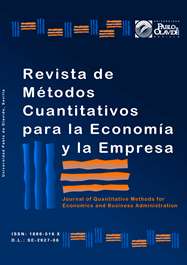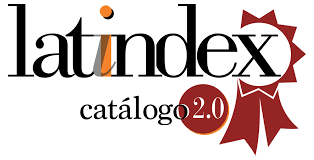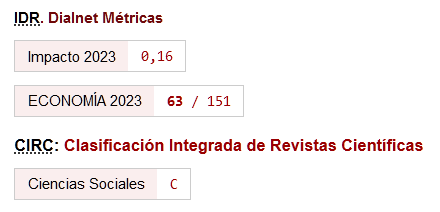Evaluación del nivel de sostenibilidad en la gestión de las tecnologías y sistemas de información a través de la Lógica Difusa Compensatoria
DOI:
https://doi.org/10.46661/revmetodoscuanteconempresa.4383Palabras clave:
sostenibilidad corporativa, gestión de tecnologías y sistemas de información, lógica difusa compensatoriaResumen
Las Tecnologías de la Información y las Comunicaciones han contribuido significativamente al desarrollo económico y social de la sociedad actual. La comunidad científica internacional está debatiendo sobre los efectos negativos y positivos de éstas y su relación con el medio ambiente y buscan soluciones en las tecnologías y sistemas de información sostenibles. El presente artículo propone un procedimiento para determinar el nivel de sostenibilidad en la gestión de tecnologías y sistemas de información a través del empleo de la Lógica Difusa Compensatoria en una organización. Los resultados de la aplicación del procedimiento permitieron calcular y evaluar el nivel de sostenibilidad en la gestión de sistemas y tecnologías de información. Tras analizar los resultados, se determinaron los criterios de medida peores evaluados entre los que se encontraron: la instalación de switches inteligentes, el despliegue de sistemas de enfriamiento libre, la implantación de tecnologías inteligentes, el uso de tecnología ecológica y la gestión de estrategias de Tecnologías y Sistemas de Información Sostenibles.
Descargas
Citas
Andrade, R.A.E., González, E.F., & Caballero, E.G. (2014). Un sistema lógico para el razonamiento y la toma de decisiones: la lógica difusa compensatoria basada en la media geométrica. Investigación Operacional, 32(3), 230-245.
Antelo-González, Y.Y., & Alfonso-Robaina, D. (2015). Análisis de la Responsabilidad Social Empresarial basado en un modelo de Lógica Difusa Compensatoria. Ingeniería Industrial, 36(1), 58-69.
Asadi, S., Hussin, A.R.C., & Dahlan, H. M. (2017). Organizational research in the field of Green IT: A systematic literature review from 2007 to 2016. Telematics and Informatics, 34(7), 1191-1249. https://doi.org/10.1016/j.tele.2017.05.009
Bouchet, A., Pastore, J., Brun, M., & Ballarin, V. (2010, noviembre). Lógica Difusa Compensatoria basada en la media aritmética y su aplicación en la Morfología Matemática Difusa. TRIC IV Cuarto Torneo Regional de Inteligencia Computacional. IEEE CIS Computational Intelligence Society, Universidad de Palermo, Buenos Aires.
Cabero-Almenara, J., & Barroso-Osuna, J. (2013). La utilización del juicio de experto para la evaluación de TIC: el coeficiente de competencia experta. Revista de Pedagogía, 65(2), 25-38.
Cejas-Montero, J. (2011). La lógica difusa compensatoria. Ingeniería Industrial, 32(2), 157-161.
CEPAL (2012). Las tecnologías de la información y de las comunicaciones (TIC) y el desarrollo sostenible en América Latina y el Caribe: experiencias e iniciativas de política. https://repositorio.cepal.org/bitstream/handle/11362/7062/1/S2013435_es.pdf
Chan, H.K.B., & Johansson, M. (2014). Green IS – a Systematic Literature Review. (Tesis de grado). University of Borås, Suecia. https://www.diva-portal.org/smash/get/diva2:1309721/FULLTEXT01.pdf
Chen, E. T. (2019). Green IT and the Struggle for a Widespread Adoption. En Mehdi Khosrow-Pour, D.B.A. (Ed.), Advanced Methodologies and Technologies in Engineering and Environmental Science, (pp. 157-166). Massachusetts: IGI Global.
Filho, W.L., Will, M., Salvia, A.L., Adomßent, M., Grahl, A., & Spira, F. (2019). The role of green and Sustainability Offices in fostering sustainability efforts at higher education institutions. Journal of Cleaner Production, 232, 1394-1401. https://doi.org/10.1016/j.jclepro.2019.05.273
Gartner, Inc. (2007, 26 de abril). Gartner Estimates ICT Industry Accounts for 2 Percent of Global CO2 Emissions. https://www.gartner.com/en
Khor, K.-S., Thurasamy, R., Ahmad, N.H., Halim, H.A., & May-Chiun, L. (2015). Bridging the Gap of Green IT/IS and Sustainable Consumption. Global Business Review, 16(4), 571-593. https://doi.org/10.1177/0972150915581101
Lai, R S., Hsu, L.-L., Chen, J.C., & Chang, M.D. (2012). A Case Study on Green Information System. ASBBS Proceedings, 19(1), 512-519.
Lamis, J.M., Soler, J.A.P., Delgado, F.M., & García, M.N. (2018). Metodología para priorizar iniciativas de tecnologías de la información sostenibles. Contaduría y Administración, 65(2), 1-19. https://doi.org/10.22201/fca.24488410e.2019.2062
Loeser, F., Recker, J., Brocke, J. vom, Molla, A., & Zarnekow, R. (2017). How IT executives create organizational benefits by translating environmental strategies into Green IS initiatives. Information Systems Journal, 27(4), 503-553. https://doi.org/10.1111/isj.12136
Melville, N.P. (2010). Information systems innovation for environmental sustainability. MIS quarterly, 34(1), 1-21.
Michalus, J.C., Castro, S., William, A., & Hernández-Pérez, G. (2015). Método de expertos para la evaluación ex-ante de una solución organizativa. Visión de futuro, 19(1), 1-17.
Molla, A. (2013). Identifying IT sustainability performance drivers: Instrument development and validation. Information Systems Frontiers, 15(5), 705-723. https://doi.org/10.1007/s10796-013-9415-z
Morales, G. (2002). Introducción a la lógica difusa. México: Centro de Investigación y Estudios Avanzados.
Novák, V., Perfilieva, I., & Mockor, J. (2012). Mathematical Principles of Fuzzy Logic. Ostrava: Springer Science & Business Media.
Pattinson, C. (2017). ICT and Green Sustainability Research and Teaching. IFAC-PapersOnLine, 50(1), 12938-12943. https://doi.org/10.1016/j.ifacol.2017.08.1794
Racet-Valdés, A., Espinosa-González, L., Suárez-Quintana, J., Sánchez-Pérez, Y., Alfonso-Robaina, D., & Martínez-Pérez, E. (2017). Modelo matemático para medir el nivel de servicio al cliente basado en la lógica difusa compensatoria. Ingeniería Industrial, 38(2), 193-200.
Sarache-Castro, W.A., Costa-Salas, Y.J., & Martínez-Giraldo, J.P. (2015). Environmental performance evaluation under a green supply chain approach. DYNA, 82(189), 207-215. https://doi.org/10.15446/dyna.v82n189.48550
Saunila, M., Nasiri, M., Ukko, J., & Rantala, T. (2019). Smart technologies and corporate sustainability: The mediation effect of corporate sustainability strategy. Computers in Industry, 108, 178-185. https://doi.org/10.1016/j.compind.2019.03.003
Villa, A. (2019). Generación automática inteligente de resúmenes de textos con técnicas de soft computing (Tesis doctoral). Universidad Nacional de La Plata, Buenos Aires. https://ruidera.uclm.es/xmlui/bitstream/handle/10578/22270/TESIS%20Villa%20Monte.pdf?sequence=1&isAllowed=y
Xu, J., & Zhou X. (2011). Fuzzy-Like Multiple Objective Decision Making. Berlín: Springer.
Zadeh, L.A., Klir, G.J., & Yuan, B. (1996). Fuzzy Sets, Fuzzy Logic, and Fuzzy Systems. Singapore: World Scientific.
Publicado
Cómo citar
Número
Sección
Licencia

Esta obra está bajo una licencia internacional Creative Commons Atribución-CompartirIgual 4.0.
El envío de un manuscrito a la Revista supone que el trabajo no ha sido publicado anteriormente (excepto en la forma de un abstract o como parte de una tesis), que no está bajo consideración para su publicación en ninguna otra revista o editorial y que, en caso de aceptación, los autores están conforme con la transferencia automática del copyright a la Revista para su publicación y difusión. Los autores retendrán los derechos de autor para usar y compartir su artículo con un uso personal, institucional o con fines docentes; igualmente retiene los derechos de patente, de marca registrada (en caso de que sean aplicables) o derechos morales de autor (incluyendo los datos de investigación).
Los artículos publicados en la Revista están sujetos a la licencia Creative Commons CC-BY-SA de tipo Reconocimiento-CompartirIgual. Se permite el uso comercial de la obra, reconociendo su autoría, y de las posibles obras derivadas, la distribución de las cuales se debe hacer con una licencia igual a la que regula la obra original.
Hasta el volumen 21 se ha estado empleando la versión de licencia CC-BY-SA 3.0 ES y se ha comenzado a usar la versión CC-BY-SA 4.0 desde el volumen 22.










